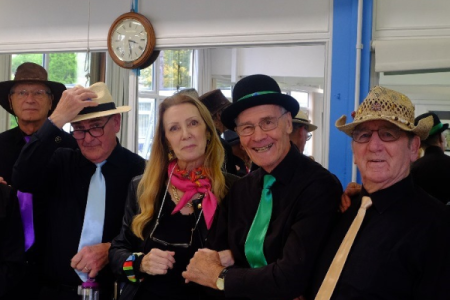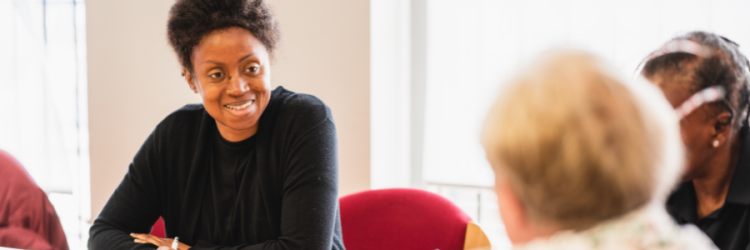To mark Safeguarding Adults Week 2024, Emily and Ruth, our designated and deputy safeguarding leads, reflect on some of the brilliant organisations we work in partnership with to ensure we protect and respect the rights of everyone to live free from abuse and neglect.
Emily: Safeguarding isn’t always the easiest thing to talk about, and in our roles, we often have challenging conversations with older people and volunteers about concerns they might have around their welfare and wellbeing. Nevertheless, being responsible for safeguarding is an enormous privilege, and it’s rewarding to know we’ve been able to identify challenges in someone’s life and connect them to support, advice or organisations that are best placed to help them.
Whilst we’re experts in loneliness and isolation and provide services that are designed to improve the connection and support someone has, later life can pose several challenges. We work closely with different organisations who are sometimes better suited than us to coordinate the right kind of help.
In recent weeks, I’ve researched face-to-face befriending programmes in an older person’s local area for home visits, provided information about specialist mental health charities like Mind, offered guidance about how to approach the local council for a care needs assessment, and made referrals to adult social care teams, when an additional level of support and expertise has been required.
Often, our roles are about protecting someone’s welfare before the issues they face become a safeguarding concern, and we’re currently designing a training programme for staff, which will launch next year. This initiative will keep all our team up to date with the help available for people who may be facing financial hardship, have a diagnosis of dementia, or are struggling to have their care needs met, alongside other challenges that can become more prevalent in later life.
I’m excited to connect with new organisations to provide this training and excited to work with Ruth, and with Clare, our deputy designated safeguarding lead and single point of contact, on how we can empower staff, volunteers and older people to keep themselves safe, well, and connected.
Ruth: My safeguarding role at Re-engage involves directly helping and supporting anyone who has a concern about someone, as well as ensuring the person who the concern is about has wraparound care and support in place and feels heard. More broadly it extends to supporting colleagues with concerns, making sure that signposting information is available, and ensuring that training updates and the latest information is shared and available.
No two days in safeguarding are the same; the calls can vary greatly, and so can the outcomes. For some people, a simple chat and signposting is all they need, and for others, it could be referrals to multiple services such as adult social care, food banks or community transport.
Some calls can be lighthearted, with straight-forward solutions and positive outcomes. However, not all calls are like this, and sometimes people can be in crisis, or they may be very distressed, and that’s where, of course, knowledge and training come in. as does the support of others in the safeguarding team. Safeguarding is often about working together with others to prevent harm.
An individualised and tailored approach to working with other organisations is key; it’s important to find services that best fit the needs of the person who needs support. For one person, that could be a large national organisation such as Mind, Cruse, or Citizen’s Advice. At other times, local services are a better fit, such as lunch clubs or transport services, or locally commissioned services for domestic abuse support. Sometimes statutory agencies are the right route, such as adult social care, police, or the NHS.
Our safeguarding team is available for anyone concerned about an older person using a Re-engage service and concerns can be raised via our online form.
-
View
More news

Guests are mad for Cheshire tea party group
An afternoon of entertainment from the Mad Hatters kept guests entertained at recent tea party.
By Re-engage

Home-made Christmas hit for Re-engage
Re-engage supporter Sam Clegg has taken the charts and internet by storm with his home-made, John Lewis-inspired, festive film featuring the Christmas tune ‘Send me a Sign’, which highlight the impact of loneliness.
By Re-engage

